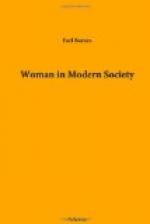Then, too, there is a tradition of government, established by the fathers and modified by experience, which should be understood by the citizens. It recognizes certain rights as being reserved by the individual States, and others as belonging to the national government. The would-be citizen should be acquainted with this tradition so that he can determine how far it is desirable to adopt a new nationalism. He will have to pass judgment on the control of interstate commerce, national or State control of public lands, national divorce and liquor laws, national food inspection, and other practical subjects which may destroy the older balance of power so jealously guarded by our earlier statesmen. The citizen must make up his mind if this is desirable.
Newer political theories must also receive the citizens’ attention. Many people believe that wealth created by the people can be enjoyed by the people only when they control the sources of supply and the means of production and distribution. The citizen should know whether these socialist tendencies should be favored or suppressed. There are others who believe that government is unnecessary, and that men and women can be happy and effective only when formal laws are abrogated. The citizen must determine whether he will allow those who hold such doctrines to express them; or whether he will suppress their meetings and forbid them to enter the country. These are but a few of the subjects concerning which the citizen must think, but they are typical and they may represent the rest.
In the last analysis, it is these judgments on political matters which govern a modern democracy, whatever the laws on the statute books may be, and whatever machinery of government may be established.
Not long since, I visited one of our States where the laws forbid any one to make or sell, as a beverage, any intoxicating liquors, within the State. At the leading hotel, in the large city where I stopped, beer and whiskey signs were displayed outside the entrance; and at an open bar, in the center of the hotel, four bartenders were dispensing all kinds of drinks, while at the tables of the hotel restaurant, liquors were openly bought and drunk. There are many indictments standing against this hotel, but in two test cases juries have refused to convict the proprietors. I am told it is the same in all of the principal hotels in the larger cities of this State. In this same State, the laws forbid the manufacture or sale of cigarettes, but they are openly displayed and sold in nearly all cigar stores. In the same State, whites and blacks live under the same laws, but blacks seldom vote; they do not use the parks, attend white people’s meetings nor ride with the whites in public conveyances. And yet the city was quiet and orderly and I felt as safe in person and property as though the laws on the statute books, instead of the judgments in the public mind, were being obeyed. Since this form of public opinion is so powerful, it is well that it should be intelligent.




